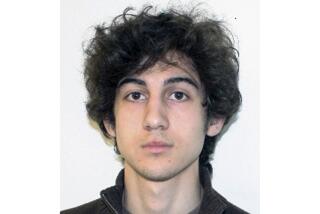Ft. Hood death sentence raises thorny legal questions
HOUSTON — Before Maj. Nidal Malik Hasan represented himself at his court-martial last month, charged with carrying out the bloody rampage at Ft. Hood, many wondered: What would he say?
Victims scheduled to testify spoke of their concern that Hasan would bait them during cross-examination.
Legal experts speculated that the Army psychiatrist might pontificate or otherwise disrupt the proceedings at the central Texas Army base.
But in the end, the American-born Muslim — who shouted “Allahu akbar,” Arabic for “God is great,” before opening fire — said and did very little in the courtroom.
Hasan, 42, called no witnesses, gave no closing arguments and made no final statement Wednesday before the jury sentenced him to death. Which raises a thorny legal question: Should defendants in such high-stakes military cases be allowed to represent themselves?
“To have this happen in a major, capital case is highly unusual. I’ve never seen anything quite like this,” said Richard Rosen, a retired colonel and law professor at Texas Tech University School of Law. “I certainly think it will be an appellate issue.”
Hasan had repeatedly attempted to plead guilty to the Nov. 5, 2009, shooting, but was barred by military law because it was a capital case. In the military, defendants can represent themselves in capital cases if they are deemed competent.
Hasan asked to fire his military attorneys and represent himself this year. The military judge, Col. Tara Osborn, had Hasan examined by a doctor and questioned him for about an hour concerning his ability to handle complex death penalty litigation.
“How are you, with no formal legal training or education, going to know what to do when the other side has that level of education?” Osborn asked.
“I’m going to do the best I can do,” Hasan said.
When he told the judge he was representing himself for strategic reasons, she urged him to reconsider.
“You would be better off with a trained lawyer who would know the rules of court-martial, the rules of evidence, the rules of law,” she said.
At one point, when the judge asked Hasan to list the charges he was facing — 13 counts of premeditated murder and 32 counts of attempted premeditated murder — he faltered.
Osborn allowed Hasan to represent himself, but insisted over his objections that his three military attorneys remain at his side as standby counsel, or legal advisors.
He told the judge he intended to present a “defense of others” legal argument, admitting that he attacked deploying soldiers but rationalizing that he did so to protect Taliban leaders overseas. The judge rejected that defense, saying it was not allowed under military law.
Even so, Hasan appeared engaged at the start of his court-martial. In his opening statement he admitted to the shooting and reiterated his “defense of others” claim, saying he grew disillusioned with the U.S. military, switched sides and became a mujahedin, or Muslim guerrilla fighter. He cross-examined a former supervisor, noting that the doctor gave him a glowing performance evaluation before the shooting.
But Hasan did little else after that.
“He didn’t want to play in this game, to participate in the process,” said Geoffrey Corn, a former military prosecutor who is now a professor at South Texas College of Law in Houston.
Hasan effectively boycotted the proceedings, rarely objecting and submitting only a single piece of evidence — his glowing performance evaluation.
At one point, his military legal advisors asked to be removed, accusing Hasan of seeking the death penalty. He denied the allegation.
In their request, unsealed after sentencing, the lawyers appeared to have irreconcilable differences with Hasan, arguing that his trial strategy was “imprudent, repugnant and possibly criminal.”
They also suggested that his strategy was intended to send a message. “Maj. Hasan’s strategy, if presented, will serve the purpose of encouraging the enemies of the United States to continue their fight against the armed forces,” they wrote.
The judge repeatedly urged Hasan to rely on his military advisors, or on a private lawyer, particularly at sentencing.
“You understand that if you continue to represent yourself, you cannot later claim that your representation was ineffective?” she asked.
Such a precedent was set in 1975, in the U.S. Supreme Court case Faretta vs. California, in which a Los Angeles man with no legal training who initially chose to represent himself was later convicted of grand theft and sentenced to life in prison. The court found defendants have a fundamental right to act as their own lawyers, but that they could not later claim ineffective assistance of counsel.
Hasan’s civil attorney, John Galligan, dismissed the court-martial as “a big show” by military legal advisors who ignored Hasan’s wishes, a “kill team” of prosecutors who refused his pleas and a judge who tied his hands.
Galligan, a former military judge, said that after the judge barred Hasan from pleading guilty or presenting his “defense of others” argument, he had nothing left to argue — so he didn’t bother.
Galligan noted that the same day Hasan was convicted, another military defendant charged with even more counts of premeditated murder was allowed to plead guilty and receive a life sentence.
Army Staff Sgt. Robert Bales, 40, pleaded guilty to murdering 16 civilians in Afghanistan last year.
Corn said Hasan could not have brokered the same plea deal as Bales “because he didn’t believe he was guilty.”
At sentencing, Hasan agreed with prosecutors that the jury should not be told he tried to plead guilty because, even though he admitted to the shooting, he never admitted to having criminal intent — an essential element of a guilty plea. The judge agreed.
“He admitted to the act; he didn’t admit to the criminal mental state,” Corn said.
Bales, by contrast, took responsibility for his crimes.
“Bales was able to take an oath, stand before the jury and say, ‘I am guilty. Here’s why,’” Corn said.
But Galligan says that military prosecutors could have made a plea deal with Hasan.
“The death penalty is unevenly applied in the military,” he said. “This will be an ugly appeal.”
molly.hennessy-fiske@latimes.com
More to Read
Start your day right
Sign up for Essential California for news, features and recommendations from the L.A. Times and beyond in your inbox six days a week.
You may occasionally receive promotional content from the Los Angeles Times.






